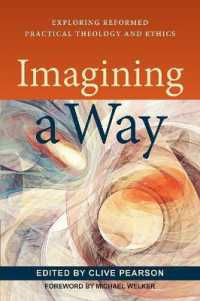- ホーム
- > 洋書
- > 英文書
- > Politics / International Relations
Full Description
This series brings together the most significant journal articles to appear in the field of comparative politics since the 1970s. The aim is to render accessible to teachers, researchers and students, an extensive range of essays as a basis for understanding established terrain and new ground.
Contents
Volume I. Part 1 Twilights and transformations: Civil society in reforming Communist regimes - the logic of emergence, Marcia Wiegle and Jim Butterfield, 1992; the rise of public legitimation in the Soviet Union and Eastern Europe, Daniel N. Nelson, 1992; civil society and democratic transition in East Central Europe, Michael Bernhard, 1993; political transition processes in Central and Eastern Europe, Helga Welsh, 1994; continuity and change in Eastern Europe - strategies of post-Communist politics, Andrew Janos, 1994; explaining political and economic change in post-Communist Eastern Europe, Beverly Crawford and Arend Lijphar, 1995. Part 2 Structures of government: post-authoritarian elections - testing expectations about "first" elections, Arthur W. Turner, 1993; public trust in the new parliaments of Central and Eastern Europe, John R. Hibbing and Samuel C. Patterson, 1994; presidents versus prime ministers - shaping executive authority in Eastern Europe, Thomas A. Baylis, 1996; the meaning of elections in transitional democracies, John Pammet and Joan DeBardeleben; transitional electoral systems in post-Communist Eastern Europe, John T. Ishiyama, 1997; preference for presidentialism - post-Communist regime change in Russian and the newly independent states, Gerald M. Easter, 1997. (Part contents) Volume II. Part 1 Values and political change: the politics and economics of democratic commitment - support for democracy in transition societies, Geoffrey Evans and Stephen Whitefield, 1995; trajectories of hope and fear - support for democracy in post-Communist Europe, William Mishler and Richard Rose, 1996; re-evaluating mass support for political and economic change in Russia, Robert J. Brym, 1996; political and economic markets - connecting attitudes towards political democracy and a market economy within the mass culture of Russia and Ukraine, James L. Gibson, 1996; conceptions of democracy among mass and elite in post-Soviet societies, Arthur H. Miller et al, 1997; trust, distrust and scepticism - popular evaluations of civil and political institutions in post-Communist states, William Mishler and Richard Rose, 1997. Part 2 Politics and society: women and democratization - conceptualizing gender relations in transition politics, Georgina Waylen, 1994; economic chaos and the fragility of democratic transition in former Communist regimes, Raymond M. Duch, 1995; recombinant property in East European captialism, David Stark, 1996; civil society endangered, Daniel Nelson, 1996;from Soviet nomenklatura to Russian elite, Olga Kryshtanovskaya and Stephen White, 1996 (Part contents.)








